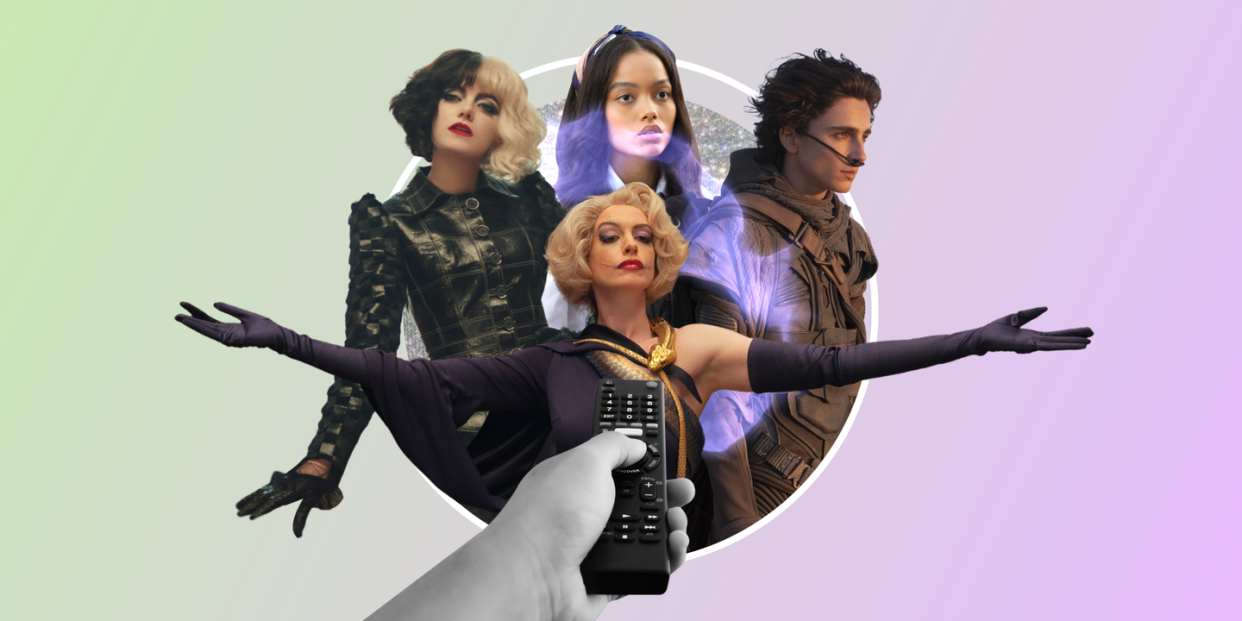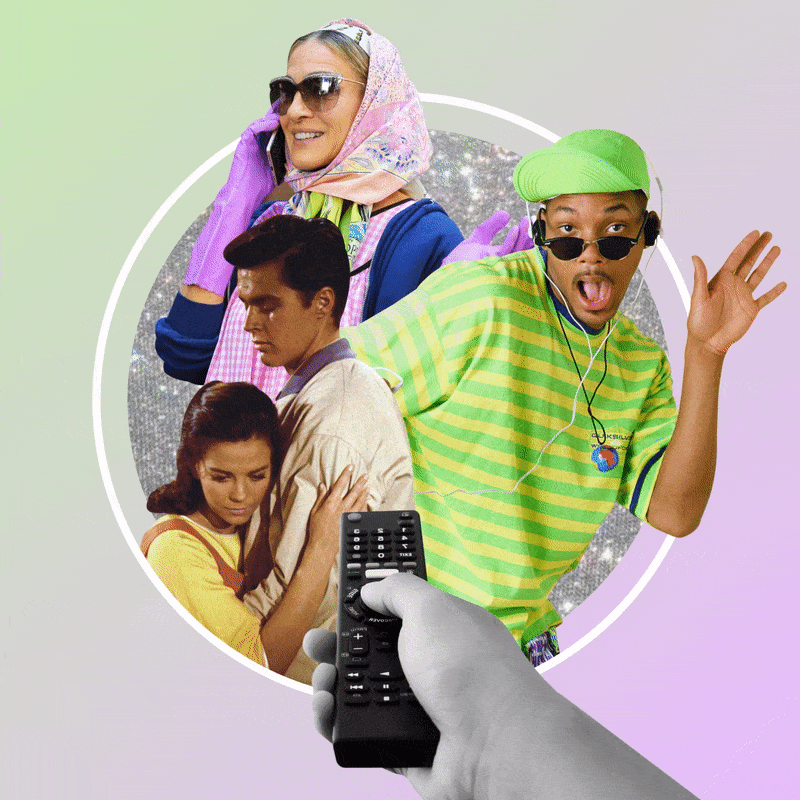There's a reason why there are so many remakes right now

If, the last time you turned on your TV, you were convinced you'd somehow fallen into a kind of relentless time loop, you're probably not the only one. In fact, you'd be forgiven for thinking that the entertainment world has simply travelled back through time, defying all metaphysical norms and stayed there. At least, that's seems to be the only way to explain why everything is a reboot, a remake or a sequel of something that came before it.
Film and TV reboots are nothing new, but then, nothing new is perhaps the perfect summary of the entertainment industry right now. From Sex and The City to Gossip Girl and Dune to West Side Story, how did Hollywood get so addicted to remakes?
Over the years these rare returning favourites seem to have turned into unwelcome houseguests, showing up unannounced and refusing to leave.
There's no pin-pointing where it all started. You'll likely remember the first time a show or film you loved got remade and, probably, you were overjoyed to welcome it back into your eyeballs. But, over the years these rare returning favourites seem to have turned into unwelcome houseguests, showing up unannounced and refusing to leave.
There have always been remakes, but increasingly there seems to be nothing else. Just this year we've had Cruella, He's All That, Guilty and The Many Saints of Newark, to name a few, with And Just Like That..., Dune, West Side Story, Home Alone and a Grease spin-off all on the way. Meanwhile in TV, Gossip Girl, Will & Grace, The Fresh Prince of Bel-Air, Oliver Twist and How I Met Your Mother have all had - or are getting - the remake treatment.
And when they're not remakes they're sequels; the umpteenth go around in a franchise that should have ended long ago. Either way the shows and films you grew up with are back. Re-packaged, re-modelled and re-marketed, but still faintly recognisable.
According to Dr Matthew Jones, Film Studies lecturer at De Montfort University in Leicester and a specialist in 20th century British cinema and audiences, the entertainment revival machine is, and always has been, cyclical.
"Remake and reboot culture is not new," he tells Cosmopolitan. "It's often framed as something novel and unique to our postmodern times, but there is actually a rich tradition of remakes in Western film culture that runs back to the earliest days of cinema (arguably as far back as 1896). The interesting thing about remakes isn’t really that they exist or are significant in number, but rather that there are more of them at certain moments in history. And we're certainly in one of those moments now."
Trapped on memory lane?
Reddit is teeming with people who are sick of the reboot trend. From one thread asking, "Is Hollywood running out of ideas?" to another stating, "I'm really so tired of reboots and remakes," it often seems as though interest in reviving previously done stories has turned into full-on entertainment ennui. So, why then, are they still being made?
One school of thought suggests that the remake genre is so pervasive because for the production companies, actors and brands involved in the films, it's a safe bet. You don't have to drum up interest in a new concept, story or character because there's a ready-made audience there for the taking. You can capitalise on the connections people already have with their favourite characters, while tapping into the feeling of nostalgia we're all so readily intoxicated by.

"The most secure option for studios is always going to be something we call a 'pre-sold property', which means a film that has a built-in audience that one can all but guarantee will go and see the film," Dr Jones adds. "Meaning films with pre-existing fan audiences, and what types of films have fan audiences before they are even release? Remakes, reboots and sequels do, precisely because they are already properties familiar to audiences and which some people will feel an emotional attachment to already.
"This is not laziness on the part of the production studios. It's just good, sound financial logic," he adds.
Disney and the remake model
Just look at how many Disney films are being remade at the moment. Mulan, The Jungle Book, Dumbo, Aladdin and Beauty and the Beast are some of its most recent remakes with many more on the list to come. The distributor has done this so prolifically, in fact, that many of its latest and upcoming projects are revivals of their own remakes, like the 2021 Cruella, a prequel to the 1996 101 Dalmations starring Glenn Close, which was in itself a live-action remake of the 1996 cartoon version.
For Disney, this remake model is an obvious one (the studio has reportedly invested huge amounts in remakes over the last decade), since it's their own projects they're reviving they don't need to spend on buying the intellectual property rights for titles from elsewhere. They can simply look to pre-existing projects and revamp them for a modern-day audience; add a little CGI, a big-name lead and a zeitgeist-y soundtrack and it's likely to be a big hitter. This is why Disney is so flush with remakes (which have reportedly made then more than £5bn since 2010), sequels and reboots, where others like AppleTV+ and Netflix aren't - they just don't have the archives to mine from.

While this remake trend can often feel frustrating for viewers, one school of thought is that it actually allows filmmakers more creativity in other projects. Prequels, sequels, reboots and remakes tend to be so secure that they can be usually be reliably counted on to make up any shortfall over more risky or daring projects, giving the studios to take a chance on films or series that may otherwise not see the light of day. It's an entertainment catch 22; arguably, the more Hollywood focuses on remakes the fewer new and daring concepts will get a shot. But on the other hand, without that guaranteed money from every single time Cinderella makes an outing, you don't have to budget for anything else anyway.
"They need to be sure they can secure a profit during turbulent economic times, so they are hedging their bets by banking on familiar stories and franchises."
Take Squid Game, for example, the wildly popular Korean drama surpassed all of Netflix's previous most-watched shows to set a new record. It quickly became a cultural phenomenon, showing up almost everywhere on social media amid news stories about the show's creator having the project turned down by studios for more than a decade. Sure, it's hard to imagine now, but the argument would be that without the certainty of money coming in from sure-thing projects, can these studios risk taking a gamble on a brand new concept?
As Dr Jones says, "They need to be sure they can secure a profit during turbulent economic times, so they are hedging their bets by banking on familiar stories and franchises. If I were gambling tens of millions of dollars by investing it in producing a film at a time like this, I suspect I would be doing much the same."
Where is the remake machine heading?
So, where does that leave us? Remakes are as here to stay as they ever were (reminder: they've always existed), and in fact, according to Dr Jones, the whole thing is pretty predictably cyclical anyway.
"We've seen many cycles over the last 100 years or so when these three types of films (remakes, sequels and adaptations) have all come to prominence in very large numbers simultaneously; at the start of the last decade, in the late 90s and the early 2000s. Those dates are actually really telling since they indicate that Hollywood turns to remakes, sequels and adaptations at times of major economic upheaval, so, after the dot com crash and the economic fallout of 9/11, after the 2008 financial crisis, and now in the midst of the economic devastation wrought by the coronavirus pandemic.
"In these moments, audiences find themselves with less disposable income in their pockets and Hollywood knows that, as a result, cinema ticket sales will take a hit. As a consequence, the studios' appetite for risk collapses and they turn to safe bets that they can guarantee will get bums on seats."
Follow Daniella on Instagram.
You Might Also Like

